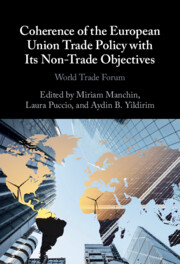Book contents
- Coherence of the European Union Trade Policy with Its Non-Trade Objectives
- Coherence of the European Union Trade Policy with Its Non-Trade Objectives
- Copyright page
- Contents
- Contributors
- Introduction
- 1 European Union Trade Policy and Non-Trade Issues
- 2 The European Union
- 3 Export Credit Agencies
- 4 The Effects of Non-Trade Provisions in Trade Agreements on Bilateral FDI
- 5 How EU Trade and Cooperation Policies Stimulated China to Go Green
- 6 The Role of Domestic Factors in the EU’s Governance of Labour Standards through Trade
- 7 EU Trade Agreements and Non-Trade Policy Objectives
- 8 Trade, the G20 and the EU
- 9 Enhancement of the European Parliament’s Monitoring for Better Coherence between Trade Policy and NTPOs
- Conclusion
- Index
- References
3 - Export Credit Agencies
The Consequences of Non-Transparency
Published online by Cambridge University Press: 19 October 2023
- Coherence of the European Union Trade Policy with Its Non-Trade Objectives
- Coherence of the European Union Trade Policy with Its Non-Trade Objectives
- Copyright page
- Contents
- Contributors
- Introduction
- 1 European Union Trade Policy and Non-Trade Issues
- 2 The European Union
- 3 Export Credit Agencies
- 4 The Effects of Non-Trade Provisions in Trade Agreements on Bilateral FDI
- 5 How EU Trade and Cooperation Policies Stimulated China to Go Green
- 6 The Role of Domestic Factors in the EU’s Governance of Labour Standards through Trade
- 7 EU Trade Agreements and Non-Trade Policy Objectives
- 8 Trade, the G20 and the EU
- 9 Enhancement of the European Parliament’s Monitoring for Better Coherence between Trade Policy and NTPOs
- Conclusion
- Index
- References
Summary
This chapter sets out the challenges and controversies in public export financing in the EU. It puts forward a statement of the problem concerning the inadequacy of the international rule book in regulating Export Credit Agencies (ECAs) with a specific focus on non-transparency. The chapter then sets out what is known about the operation of ECAs internationally and in the EU, before highlighting what is unknown about both the market and the activities of ECAs. The chapter concludes with a call for greater data transparency to underpin international cooperation efforts to develop a more inclusive and sustainable legal framework to prevent a race to the bottom in the provision of subsidies in the form of public export finance and to promote the Sustainable Development Goals through the work of ECAs.
- Type
- Chapter
- Information
- Coherence of the European Union Trade Policy with Its Non-Trade ObjectivesWorld Trade Forum, pp. 61 - 88Publisher: Cambridge University PressPrint publication year: 2023



